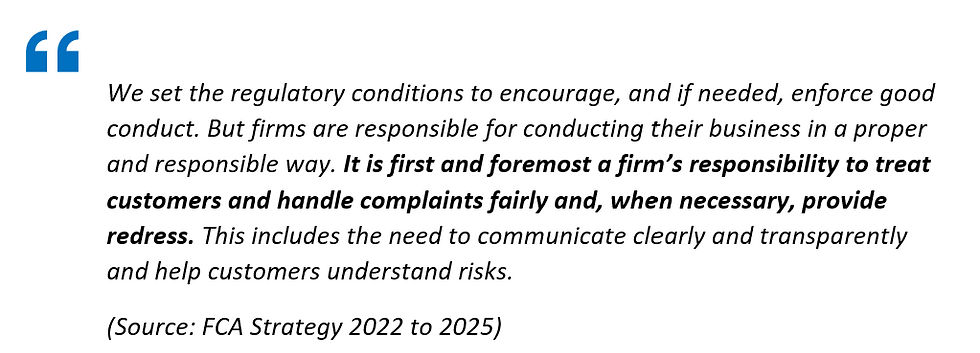Author: Priscilla Gaudoin - Head of Risk & Compliance - Originally published May 2022
Topics: Complaints, Governance, Audits
Regions and Regulators: UK, FCA
%2024%20(1).png?width=150&height=161&name=Recognised%20CPD%20Badge%20(transparent)%2024%20(1).png) Discover the impact of effective governance on complaints handling
Discover the impact of effective governance on complaints handling 
Regulatory expectations have been set with the FCA’s focus firmly upon improving the redress system. The aim is to reduce harm to consumers and to ensure those firms creating the redress burden bear the cost. Success will be measured by a firm's ability to resolve complaints in a timely manner.
Whilst timeliness is important, how well a firm investigates and reaches a fair conclusion is also crucial in demonstrating good client outcomes.
FOS view:
In a similar vein, the Financial Ombudsman Service (FOS) is keen to remind firms that complaints handling is not just about correcting a mistake, but also taking care of the client. When investigating a complaint, a firm needs to ensure that this is undertaken independently and holistically. Consideration should be given to the overall impact of any financial, practical and emotional issues affecting the client.
Under the FCA’s rules, eligible complainants can raise issues with the FOS if they are unhappy with a firm’s final response. Once the FOS has reviewed a complainant’s concerns it then contacts the firm and shares some basic information provided by the complainant that outlines:
- Complainant’s details
- Nature of the complaint
- Complainant’s description of how the firm might put things right
As part of its review, the FOS will request copies of any relevant records and details of a firm’s investigation within a specified timeframe.
Providing information to FOS:
The FOS reviews everything that took place including the timeframe within which events occurred. This helps to form an overall picture of who did what, when and how. That information may include:
- Initial disclosure documents
- Marketing materials
- Copy of advice provided
- Risk warnings
- Call recordings
- Meeting notes
- Details of the firm’s own investigation
The exact information required will depend on the nature of the complaint, whether it is mis-selling, unsuitable investment advice, failure to provide services or another issue. What’s important here is having a full picture of what happened during the contact with the client. To aid the investigation, it's helpful to pull together a precise timeframe of events that helps to identify the sequence of steps taken and when any information was communicated to the client. The timeline also helps to confirm the timeliness of any responses to the client. Firms also need to ensure that the information provided was the version in operation at the time of the complaint.
Appropriate systems and controls:
Complaints have a broad definition; whilst firms should aim to avoid them, they are likely to occur. This is where implementing and maintaining appropriate systems and controls throughout a business is vital.
A complaint could be raised at any point during a customer’s journey, so it’s crucial that firms have embedded the basic cornerstones of compliance.
Creating the right culture within a firm by communicating the firm’s stance via policies & procedures and implementing controls to mitigate risk is critical.
As part of the regulatory authorisation process, firms are asked to confirm that they have documented procedures in place. These serve a number of purposes such as:
- Demonstrating that the firm understands what it needs to do to comply
- Providing a standard process for all to follow for consistency
- Implementing controls to mitigate any risks in the process
- Enabling everyone to understand their responsibilities, what action needs to be taken, when and how it is to be completed
- Having clear escalation processes for issues
In addition, these procedures, if embedded correctly, help the firm demonstrate how it has fulfilled its duties. Evidence is equally important and might include meeting notes, client correspondence and perhaps client reports.
The evidence demonstrates that the firm didn’t just say it was doing something, but has an audit trail of what took place between the firm and the client. For the evidence to provide a good audit trail, the firm must be able to demonstrate version control over its procedures and other documents. Firms need version control over key documents to easily identify key changes to processes and implementation dates. This is particularly important for marketing materials or templates where disclosures may be made.
Additionally, whilst the firm has all of these documents, it needs to demonstrate that it has shared this information with its staff and where necessary, provided appropriate training.
All of the above steps require that the firm has robust recordkeeping in place.
Overview of the complaints process:
Firms should note that the onus is upon them to demonstrate why they might decline or refute a complaint. This means that firms need to have the following in place:
- Complaint handling system to identify, log, investigate and resolve issues
- Regular training to staff to enable identification and logging of complaints
- Impartial investigation process to reach fair and good outcomes
- Root cause analysis and feedback loop to improve processes
- Management information and trend analysis to enable board decision making
The above process should assist a firm in readily identifying issues and resolving them quickly, but the firm’s recordkeeping process and audit trail is crucial.
Ruleguard's Complaint Management Solution
With Ruleguard, your complaint handling process can be managed with our dedicated workflow and lifecycle features.
The ‘Issues’ module in Ruleguard is designed to help you capture and process risk events - from regulatory breaches to processing errors – and complaint handling is a typical part of this use-case for our customers.
All complaints can be logged directly within Ruleguard, and a bespoke workflow spanning many events and owners can be designed to see complaints through to completion. Ruleguard users see their next actions in an easy-to-understand inbox view, making the process of managing complaints straightforward and robust.
Finally, detailed MI can be produced to simplify the process of audit, and to give you insights about the root causes of your complaints and how efficiently they are being processed.

Book a discovery call
If you’d like to learn more about the Ruleguard’s Complaint Management Solution book a discovery call to see the platform in action! You can also contact us for further information on: Tel: 0800 408 3845 or hello@ruleguard.com.
Recent Blogs
Recent Webinars - Upcoming and On Demand

About the author
In a career spanning almost 30 years, Priscilla has worked as a consultant, CCO and MLRO providing regulatory oversight and advice to firms across the financial services industry. She is responsible for our thought leadership programme, writing regular articles and white papers, and hosting webinars on a variety of regulatory matters.
She is a Fellow of the International Compliance Association, a certified GRC practitioner, and a member of the Institute of Risk Management.









